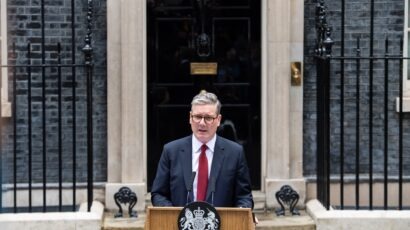
UK Climate Policy Briefing: post-Budget Update (Nov 2024)
Summary Briefing
Key takeaways for Non-Executive Directors
- Increased investment in technology and green energy: In the Autumn Budget, delivered on 30 October 2024, Chancellor of the Exchequer, Rachel Reeves, led with a strong focus on investment across the UK’s public and private sectors. The Government set the tone for its investment focus in the budget run-up, with the October International Investment Summit raising a record £63 billion in investment across sectors such as technology and green energy.
- UK policy signals clearly supporting green growth: The Budget provided clarity on the policy signals that had been outlined in Labour’s Manifesto, particularly around commitments to “Boosting capital investment by over £100 billion over the next five years, including in transport, housing and research and development (R&D), with a greater focus on value for money and delivery to help unlock long term growth.” Introducing seven pillars for “Rebuilding Britain”, the Budget placed a strong emphasis on: Economic and Fiscal Stability; Investment and Infrastructure Planning; Place (regional growth focus); People; Industrial Strategy and Trade; Innovation; and Net Zero. Prime Minister Sir Keir Starmer further strengthened these policy signals in his 12 November 2024 COP 29 speech, restating that the Government sees climate security as essential for economic security and prosperity, and confirming the UK’s 2035 Nationally Determined Contribution (NDC) target will be aligned to the independent Climate Change Committee’s recommendation, “To reduce all greenhouse gas emissions by at least 81% on 1990 levels.”
- Clarity on taxation could help build confidence in UK’s green investment market: There were a range of taxation announcements in this year’s Budget, including the Corporate Tax Roadmap 2024, which outlines the headline plans for Corporation Tax over the coming years. The Roadmap’s key commitments include developing and consulting on a new process to give investors in major projects increased advance certainty on the tax that will apply. Such clarity could help build confidence in the UK’s green investment market and kickstart the delivery of long-term green innovation and infrastructure projects.
- Government consultation on 10-year modern industrial strategy for sustainable and resilient growth: The Government has launched a green paper, Invest 2035: the UK’s Modern Industrial Strategy, setting out a 10-year plan to “drive sustainable, inclusive and resilient growth and deliver the certainty and stability businesses need to invest across the UK”, with a focus on priority high-growth sectors: advanced manufacturing, clean energy industries, creative industries, defence, digital and technologies, financial services, life sciences, and professional and business services. A public consultation is currently underway to help inform the strategy prior to its publication in Spring 2025, offering businesses an opportunity to ensure that forward-looking priorities and climate transition planning goals are in alignment with and supported by the Government’s agenda for clean growth.
- Increasing scrutiny over funding for green initiatives: Boards may want to consider how the Budget’s significant addition of £100 billion in capital spending over the next five years in investments in transport, delivering new homes, improving public services, planning reform, increasing R&D funding, and conducting a review of UK pensions - alongside related tax breaks - may inform strategy, at the same time as being aware of the increased scrutiny that businesses benefiting from these incentives will face. For example, reporting and compliance requirements could become more critical to funding eligibility as investment in green initiatives gains momentum.
Board discussion questions
- Does our business strategy or transition plan reflect the Budget and related developments? Have these changes opened up any new opportunities for industry collaboration, investment or funding? Are the initiatives outlined in the Budget, such as the Corporate Taxation Roadmap, relevant to our net zero strategy and transition planning?
- How do the policy changes relating to employers’ National Insurance impact the potential speed and cost of our green transformation?
- Do these policy changes present any risks that we were not previously aware of? Do we need to expand or adapt our strategy and/or reporting to align with current and forthcoming regulatory changes, and/or incorporate any risks not currently accounted for?
- What business perspectives and policy actions would we like to see reflected in the Government’s Modern Industrial Strategy and should we be responding to the consultation?
- Are any of the forthcoming Government consultations, including those set out in the Corporate Taxation Roadmap, relevant to our net zero activity and transition planning? Should we be capitalising on these opportunities to engage?
Coming up this quarter
- The Government is accepting technical comments on its draft regulation for ESG rating providers until 14 January 2025. The legislation is expected to be finalised next year and the FCA will then consult on the specific requirements.
- An open consultation on the UK Green Taxonomy will run until 6 February 2025. The consultation looks to gather views on the value case for introducing a Green Taxonomy as part of the UK's wider sustainable finance framework.
- The UK is set to join the Comprehensive and Progressive Agreement for Trans-Pacific Partnership (CPTPP) on 15 December 2024. The Government reports, “More than 99% of current UK goods exports to CPTPP members will be tariff-free once the deal enters into effect, helping businesses export more to CPTPP markets and contributing to the Government’s priority of driving economic growth. By 2040, the agreement could boost the UK economy by around £2 billion annually.” From 15 December, practical guides for businesses will be available online at gov.uk.
- January 2025 will see the World Economic Forum’s Annual Meeting, which will bring together over 2,500 leaders from business, government, and international organisations to address key global challenges.
- February 2025 marks the deadline for countries to submit their updated Nationally Determined Contributions (NDCs) and confirm more ambitious national climate transition and emissions reduction plans in line with the Paris Agreement’s 1.5°C target.
- The Climate Change Committee will also publish its Seventh Carbon Budget on 26 February 2025, setting out the legal limit for UK net emissions of greenhouse gases from 2038 to 2042.
Full Briefing
Introduction
Our quarterly UK policy briefing aims to highlight the latest developments in UK climate policy relevant to Non-Executive Directors (NEDs). This briefing focuses on the UK’s Autumn Budget, which was delivered by Chancellor, Rachel Reeves, on 30 October 2024. Led by the Chancellor’s promise to “invest, invest, invest”, the first of Labour’s Budgets since the July 2024 election set out the results of a one-year Spending Review and outlined the overall level of spending the Government is committing to deliver its programme for economic growth.
In the lead up to the Budget, during a speech at the International Investment Summit in October, Prime Minister Sir Keir Starmer set out a commitment to “rip out the bureaucracy that blocks investment” in UK growth. In addressing the business community in the crowd, Starmer stated, “When you go back to your board rooms and ask…Where does our money go…Where do our jobs go…Where does our investment in a better future go? Let me offer you a new answer…It’s time to back Britain.” This year’s summit saw a record doubling of 2023 investment figures, to a total of £63 billion. This investment is projected to create nearly 38,000 jobs, including in technology, green energy, and infrastructure sectors. Business and Trade Secretary, Jonathan Reynolds, has described these investments as a “major vote of confidence in the UK and our stability dividend across industry and innovation.”
The fiscal rules set out in the Budget are expected to play a critical role in determining how these investments are delivered. This briefing details some of the key climate-related takeaways from the Budget and forward-looking insights for NEDs.
Looking Ahead
Spring 2025 is an important timeframe for the commitments outlined in this Budget, with March 2025 marking the end of Phase 2 of the Government’s Spending Review, in which the official resource and capital spending envelopes will be set. A number of organisations have identified the Spring Spending Review as an opportunity to clarify the Government’s prioritisation of climate, with the Centre for Economic Transition Expertise at the London School of Economics calling for the impact of all decisions on emissions and climate resilience to be fully assessed and published alongside the review.
As discussed, a number of consultations will be taking place over the coming months to help gather feedback on commitments and their delivery. Particularly noteworthy are the consultations on the Corporate Tax Roadmap and Invest 2035: The UK’s Modern Industrial Strategy. These consultations present an avenue through which businesses and other stakeholders can influence and engage with direction of travel for policies aimed at supporting growth.
Relevant Policy Resources
For NEDs interested in more in-depth research relating to the recent Budget and UK economic policy, there are a range of resources available, including:
- The Cambridge Zero Policy Forum has recently released a report: Is reaching net zero a growth and prosperity plan?, which aims to support decisionmakers in HM Treasury and the wider UK Government in steering the UK’s green economic transition. The report highlights a number of economic tools and analysis that HM Treasury can utilise to deliver resilient net zero investment, with lead author, Dimitri Zenghelis, explaining, “If the Treasury is serious about dealing with the challenges of growth and productivity and climate mitigation, then it must be willing to reassess its decision-making process.” The report is a particularly useful resource for NEDs interested in the macroeconomic narrative of the UK’s economic challenges and policy commitments over time.
- Experts from the G20 have published a report: A Green and Just Planet: The 1.5°C Agenda for Governing Global Industrial and Financial Policies in the G20, which looks to set out a framework for making green growth achievable across G20 countries and globally. The report calls for a robust green industrial and finance strategy, with relevant takeaways for the private sector including policies for mobilising private sector finance towards green investments.
- The Taskforce on Nature-related Financial Disclosures (TNFD) has published a discussion paper on Nature transition plans containing draft guidance for companies and financial institutions developing transition plans in line with TNFD recommended disclosures released in 2023. The TNFD has asked for feedback on the approach laid out in the paper by February 2025.
- The Confederation of British Industry (CBI) has released a report on its Autumn Budget campaign, providing a comprehensive analysis of what was delivered, what was missing, and next steps.
- In looking towards the 2025 Spending Review, the UK’s independent public spending watchdog, the National Audit Office, has released a report, A planning and spending framework that enables long-term value for money, outlining key advice for ministers and senior officials, while also offering recommendations on how other stakeholders can practically scrutinise government spending and delivery.
- The Institute for Government has a number of analysis pieces on the 2024 Budget, offering various insights into the trade-offs and choices made.


